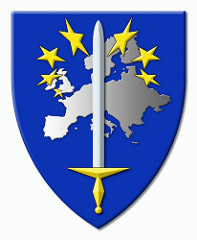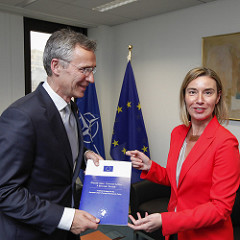 Pressure for the EU to have a bona fide independent military force is mounting. And some of it comes from Central Europe.
Pressure for the EU to have a bona fide independent military force is mounting. And some of it comes from Central Europe.
On Friday, August 26, 2016, BBC World News reported,
“The leaders of the Czech Republic and Hungary say that a European army is needed to boost security in the European Union”
The same day, DW News posted its story titled, Visegrad countries urge EU to build a common army.
The countries of the Czech Republic, Slovakia, Hungary, Poland are also known as the “Visegrad Four” or the “V4”.
The V4 were not the first to promote the idea of an EU military force. The defense issue actually has been kicked around for quite some time.
A Look Back
A few years after WWII ended the North Atlantic Treaty Organization (NATO) was formed.
NATO’s first secretary-general quipped it was set up in 1949 to “keep the Russians out, the Americans in and the Germans down.”
Part of the idea was Europe could rely heavily on North America to protect it and use more of its money to rebuild the after WWII. But 6 EU members — Austria, Cyprus, Finland, Ireland, Malta and Sweden — are not part of NATO. Also that was over six decades ago and American involvement is not what it once was.
In June 2016 the Center of Strategic and International Studies published 74 page plus Phase 2 report titled, Evaluating U.S. Army Force Posture in Europe. It reads,
“In the late 1980s, the United States maintained approximately 340,000 permanently stationed military personnel in Europe to deter the conventional threat that the Soviet Union and Warsaw Pact forces posed to West Germany and Western Europe, more broadly.”
But in the 1990s, after the fall of the Berlin wall, those numbers quickly began to drop. The last U.S. armored presence in Europe ended around 2 years ago and U.S. Army forces permanently stationed in Europe were later reduced to about 24,000 plus an additional 4,000 rotational forces.
The number today is said to be a little higher.
Franco-German Proposal
On the heels of the Brexit result in late June, France’s former prime minister and current Minister of Foreign Affairs, Jean-Marc Ayrault, and Frank-Walter Steinmeier, Germany’s current Foreign Minister and former chief of German intelligence, jointly released their proposal called, A strong Europe in a world of uncertainties.
Besides pledging to “move further towards political union in Europe” and inviting other Europeans to “join us in this endeavor”, both men called for a European Security Compact saying,
“In this context, France and Germany recommit to a shared vision of Europe as a security union … The European Union Global Strategy is a first step in that direction.”
Britain, the major opponent to a European armed services, post-Brexit can’t impede any moves toward its development.
EU Strategy

NATO Head and Ms Mogherini with the EU report
On Tuesday the 28 of June 2016, EU’s Federica Mogherini formally presented the 57 page EU Global Strategy on foreign and security policy to EU leaders in Brussels referred to in Ayrault and Steinmeier’s paper. She wrote in its forward,
“The purpose, even existence, of our Union is being questioned. Yet, our citizens and the world need a strong European Union like never before. …”
On page 19, the report to the members of the EU stated,
“None of our countries has the strength nor the resources to address these threats and seize the opportunities of our time alone. But as a Union of almost half a billion citizens, our potential is unparalleled.”
It then explained the basis for that optimism,
“Our diplomatic network runs wide and deep in all corners of the globe. Economically, we are in the world’s G3. We are the first trading partner and the first foreign investor for almost every country in the globe. Together we invest more in development cooperation than the rest of the world combined. “
And the report stressed,
“Europeans must be able to protect Europe …”
On Page 20 it stated,
“A more credible European defence is essential also for the sake of a healthy transatlantic partnership with the United States.”
America’s Viewpoint
With the memory of two world wars fading, the United States government, unlike her British counterpart, apparently welcomes the idea of Europe becoming a stronger military power.
Business Insider posted on 28 June 2016 a Reuters article with the heading, ‘Things are going to be a lot harder’: Brexit casts doubt over new EU and NATO defense strategy. According to the article,
“Until Britain’s referendum vote to leave the EU, the United States had been looking to Britain, its main ally in Europe, to act as a bridge between NATO and the EU in the process.”
However, the strategy has not changed. It added,
“The European Union and the United States plan to use two separate EU and NATO summits in the coming days to push reforms of the West’s two main security pillars, aimed at reducing Europe’s reliance on Washington in its own neighborhood.”
NATO’s summit was conducted in Poland on July 8-9, 2016.
At the summit NATO’s Secretary General, Jens Stoltenberg, signed a Joint Declaration with Robert Fico of Slovakia, President of the European Council through December 2016 and Jean-Claude Juncker, President of the European Commission.
Breaking News September 14, 2016 – BBC reported that the EU Commission President, Jean-Claude Juncker, called for an EU “military headquarters to work towards a common military force” in his “annual state of the union address“ today.
Photo Credits: Eurocorps by Rock Cohen, Mogherini by EEAS; Licenses: CC BY-SA 2.0 and CC BY-NC 2.0
Read a previous ITN article about a European military dated March 15, 2015.